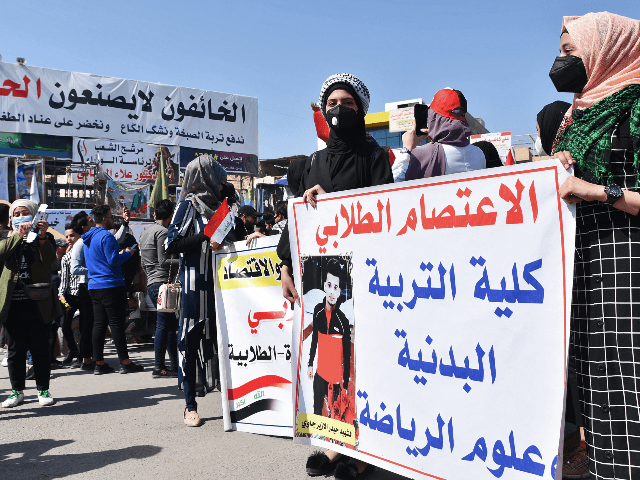Protesters in Iraq, coming up on half a year of demonstrating against the corruption and incompetence of their government, were not reassured by Baghdad’s handling of the coronavirus.
Furious that their disorganized and thoroughly looted government lacks the money and human resources to mount an effective defense, the protesters are setting up their own screening and treatment facilities, distributing information on how to prevent the spread of the disease, and giving out medical masks.
“The real virus is Iraqi politicians. We are immune to almost everything else,” grumbled a protester named Fatima to the AFP news service on Tuesday.
“Political parties and corruption are an epidemic that is much more dangerous than the coronavirus. This is the outbreak we want to get rid of because it has destroyed Iraq,” agreed another protester named Mohammad.
“Even in normal times our health care system is totally run down. Now, on top of everything, we have a coronavirus outbreak, and we are supposed to rely on these facilities?” said Fatima, an 18-year-old medical student who was doing volunteer work at one of the protesters’ clinics in Tahrir Square, the heart of the protest movement in Baghdad.
AFP grimly noted that the improvised clinics were originally put together to treat gunshot wounds and tear gas exposure. A group of protesters made that history explicit by chanting at security troopers, “Your snipers didn’t deter us, what can the coronavirus do?”
Iraq reported five new suspected coronavirus cases on Tuesday, which would bring the total to 32 if they are confirmed.
The country’s first case was diagnosed only last week. Most of Iraq’s cases to date can be traced to Iran, where Iraqi Shiites frequently travel to visit holy shrines that have become major sources of concern to epidemiologists (and the scenes of some very ill-considered acts of defiance against the virus).
The Iraqi protest movement was already critical of Iran’s influence over politics in Iraq. According to AFP, “anti-Iranian sentiment” is on the rise due to the coronavirus. Iranian officials have been notoriously secretive about the spread of the virus in their country, and the protesters think Iraqi officials have been no more honest.
Iraq’s containment procedures proved a mixed blessing for the protesters, since school closings freed up more students to take to the streets, while some influential Iraqis have instructed their followers to stay home to keep the coronavirus from spreading. The resignation of Iraqi Prime Minister-designate Mohammed Allawi on Monday infused the demonstrations with renewed energy.
Kurdish news service Rudaw was not favorably impressed by how the government of the semi-autonomous Kurdistan Region of Iraq is handling the epidemic:
Rumors and mixed messages about the coronavirus spread on social media and by word of mouth have left Erbil residents frightened and confused, undermining measures to prevent an outbreak in the Kurdistan Region.
Even though coronavirus is spread through person to person contact and can be transmitted rapidly in crowded urban spaces, Erbil’s downtown bazaar was packed with shoppers and traders on Saturday evening.
[…]
It seems a lot of the misinformation spreading in Erbil is coming from social media – often an unreliable source. Dilshad Kochar, 29, who sells mobile phone cases in the Erbil bazaar, said the public has been left “ignorant”.
“Now it turns out that social media is full of lies,” he said. “Look, in the last few days, every pharmacy was packed with people buying masks. Now you show me how many people use masks. You will barely find anyone.”
“I read on social media a list of nutritional items needed to strengthen the immune system such as apples, lemons, and oranges,” Kochar said.
“But then yesterday, I came across a friend who had seen a doctor. The doctor had advised him not to eat anything that contains sugar, even fruits and vegetables including apples and lemons and other stuff. You tell me, what should I do?” he added with exasperation.
Kochar told Rudaw he was particularly happy to learn from the social media rumor mill that “smoking is good,” which would come as surprising news to the coronavirus victims of China, a land of heavy smokers. Other odd beliefs floating around Kurdistan include women having exceptional resistance to infection, children under 12 being completely immune, and the virus being a microscopic soldier of Allah sent to punish the Chinese for bullying Muslims.
The Kurdistan Regional Government reported its fifth case of the coronavirus on Monday in the province of Sulaimani. The head of the Sulaimani Health Directorate denied rumors that one of the patients was killed by the coronavirus.

COMMENTS
Please let us know if you're having issues with commenting.